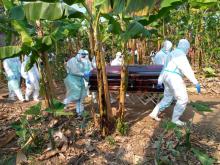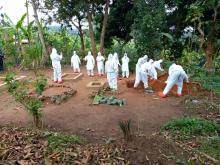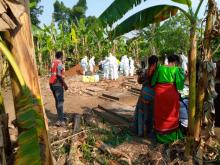The “Angels” Who Bury the COVID-19 Dead Alone
Kampala, 5th October 2020:- “Angels” is a name one would hardly associate with the COVID-19 burial teams, but in greater Masaka sub-region, southern Uganda, they are known as such.
It all started in Kyambogo village Lwankoni sub-county in Kyoteera district where the team had gone to conduct a safe and dignified burial of a deceased COVID-19 patient brought from Kampala. It was a sight to behold for the locals. They had never seen such a team let alone witness a COVID-19 death.
“The team came fully donned in their Personal Protective Equipment which was mystical to the community members. Many ran away upon seeing them,” says Dr Edward Muwanga the District Health Officer for Kyoteera.
Added to the mystic was the requirement that nobody apart from the team members should come near the coffin and that everybody should be at least 5 meters away. Every place the team passed on the way to the already prepared grave was sprayed with diluted liquid chlorine from a spray pump.
Burials have never been like this in Kyoteera. In this community, Uganda and indeed Africa, deaths and burials are grand ceremonies complete with wailing, tearing of hair, touching or washing the dead and many more to give the departed a befitting send-off. Communal eating, dancing, drumming are also done in many societies and these go on for days.
Therefore, to say that COVID-19 has fundamentally changed burial routine in Kyoteera and Uganda generally is an understatement of what the locals are witnessing. With COVID-19 cases and deaths rising every day, this is the new life the local have to adapt.
Dr Mark Juuko, a stickler to Standard Operating Procedures (SoPs) heads the 10-man burial team for Kyoteera district. He makes sure this team follows and implements the SoPs to the letter. “It is very important to follow procedures to prevent the spread of the infection and to protect my team,” says Dr Juuko.
As soon as Dr Juuko is notified by the Ministry of Health about the pending arrival of a COVID-19 dead body, he immediately activates the burial team. The disease surveillance officer of the area secures the burial site, supervises digging the grave and ensures that all the needed materials are available.
At the same time, the burial team commiserates with the bereaved family and the responsible officer offers the necessary psychosocial support. As this is going on, all non-essential people are evacuated and no one is allowed within 5 meters of the burial site.
And that’s where COVID-19 burials part ways with the Ugandan way of doing things. Locals have to learn not seeing their departed for “the very last time” and not taking part in the burial ceremony which is devastating for many. “We are in shock we have not bid farewell to our son for the last time as the norm is in our culture,” says Mr Salongo Kyeyune a resident of Kyambogo Village where the burial took place.
On arrival at the burial site, the team donned their Personal Protective Equipment (PPEs) making them look like angels from heaven hence the reference by the locals. The team performed all the activities including sealing the grave with concrete. When satisfied, they sprayed the place once more, ceremoniously removed their PPEs and burnt them. This is standard procedure for the team but was drama, shock and awe for the local community.
According to Dr Juuko, this whole experience has had a positive knockoff effect as far as COVID-19 behaviour change is concerned. “People are scared, reality sets in and they realize that COVID 19 is real and that people are losing their lives,” he says. In his view, the activities of the burial team have increased the “awareness and risk perception of COVID-19 in these communities”.
Usually, before the team arrives, most people are seen without masks and physical distancing and regular hand washing are alien to them. But when the team arrives, they remember to put on their masks and physically distance.
Although the COVID-19 burial procedure has mesmerized and scared the local people, they have, at the same time, cooperated very well aware that if they don’t, any of their own could easily be the next to be handled that way. “The communities and families we have visited have been cooperative, they follow instructions and the guidelines they are given, so our work has been smooth with no hiccups,” says Dr Juuko.
Current Ministry of Health protocol requires every district to have a well-trained, prepared and equipped burial team. Efforts are underway to ensure that all districts have these teams ready to carry out safe and dignified burials in the communities.
Fortunately for Uganda, preparation and setting up of the burial teams started before the COVID-19 pandemic - actually during the various haemorrhagic fever outbreaks in several districts. This investment relied heavily on support from the World Health Organization with funding from benevolent partners such as the Department for International Development (DFID), Danish International Development Agency (DANIDA) and Irish Aid.
Certainly, more work in terms of training, retraining and equipment has to be done so that all districts have fully operational burial teams. The Ministry of Health with support from WHO and partners is already working on this aspect. The only hope is that that the services of the burial teams will not be required if all people follow and implement the COVID-19 directives, guidelines and SoPs already widely and deeply shared throughout the country.
In the meantime, as the COVID-19 deaths increase in the country, the “Angels ” will continue to undertake the safe and dignified burials – alone, with communities playing minimal roles if at all. This, indeed, is part of the strange new normal that COVID-19 has brought about in Uganda.
Health Promotion Advisor
Tel. : +256 414 335505
Cell: +256 772 507906
Email: sensasib [at] who.int
Public Information Officer
Tel. : +256 313 335569
Cell: +256 786 497073
Email: mwebembezie [at] who.int





